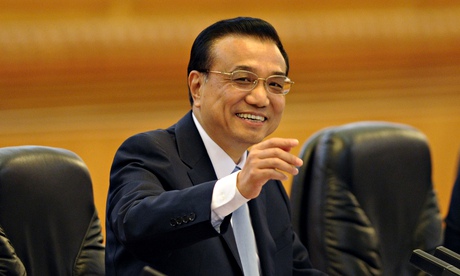
A three-day visit to Britain by the Chinese premier Li Keqiang starting on Monday is expected to lead to nearly £18bn of deals being signed, including a deepening Chinese involvement in energy, nuclear power and other UK infrastructure.
In his first visit to Britain since becoming prime minister last year, Li will also announce investment plans that George Osborne, chancellor, will argue show that London is going to be the world centre for renminbi trading.
China Construction Bank, China's second-largest lender, has been selected to become the first clearing service for renminbi trading in London. Chinese companies are expected to announce fresh details of their plans to provide finance and technology for the proposed nuclear power plant at Hinkley Point in Somerset. And the recently created China Minsheng Investment (CMI) is expected to reveal plans to set up a London office and put money into British companies. CMI, led by Dong Wenbiao, chairman of China Minsheng Banking Corporation, has about £5bn under management.
Li will be accompanied by about 200 Chinese business leaders, not all of them part of the official visit, including the heads of some of his country's biggest banks. He will meet the Queen during his stay in Britain.
Chinese companies China National Nuclear Corporation (CNNC) and China General Nuclear Power Corporation (CGN) have already agreed in principle to be minority shareholders in the Hinkley Point project.
So far only letters of intent have been signed by EDF Group, Areva, CGN and CNNC to become strategic and industrial partners in the project. The two Chinese companies were due to take a stake of between 30% and 40%, but that may yet increase.
EDF Energy, which runs 15 nuclear power plants, has been working with CGN and CNNC for 15 years. CGN currently operates 8.3 gigawatts of nuclear power. It has eight units in operation and 15 under construction, including two reactors being built in a joint venture with EDF at Taishan. CNNC has nine units in operation and 12 under construction.
Lord Prescott, former deputy prime minister and chairman of the Blair government's Chinese taskforce, predicted the Chinese government would be seeking assurances that Britain would remain in the EU, since the Chinese see Britain as a gateway to investment in the bloc.
Prescott told Sky News's Murnaghan programme: "Both the Japanese and the Chinese take the view that investment in Britain is good only after you have the access to the European market of 450 million people." He said the prime minister, David Cameron, "seems to be saying now we want to get out of it – every day he says something like that. That's going to make investors say to themselves, 'Am I going to put a long-term investment in a country that is probably going to leave Europe?' "
Prescott accused Cameron of downgrading the importance of the taskforce and said Cameron's meeting with the Dalai Lama in 2012 had been a disaster.
The Home Office will also issue a report easing restrictions on visas for Chinese visitors to Britain, a longstanding Chinese demand. There is likely to be a 24-hour "super-priority" service for important business visitors, and the extension of a pilot scheme that lets tourists receive a British entry permit at the same time as a visa for countries in the Schengen area.
Official data shows annual goods exports to China have grown to £12.4bn last year from £7.6bn in 2010 when Cameron took office.

